

Ten Speechwriting Tips. David Kusnet, former chief speechwriter to President Bill Clinton, is the Podesta Group’s senior writer and the author of several books on the economy and American politics.
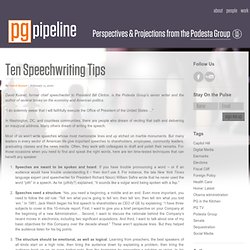
“I do solemnly swear that I will faithfully execute the Office of President of the United States …” In Washington, DC, and countless communities, there are people who dream of reciting that oath and delivering an inaugural address. Many others dream of writing the speech. Most of us won’t write speeches whose most memorable lines end up etched on marble monuments. But many leaders in every sector of American life give important speeches to shareholders, employees, community leaders, graduating classes and the news media.
Speeches are meant to be spoken and heard. For more information about this article or to provide feedback to the author, please contact David Kusnet at dkusnet@podesta.com. Speeches - The Writing Center. What this handout is about This handout will help you create an effective speech by establishing the purpose of your speech and making it easily understandable.
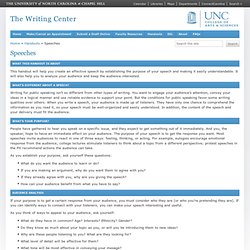
It will also help you to analyze your audience and keep the audience interested. What’s different about a speech? Writing for public speaking isn’t so different from other types of writing. You want to engage your audience’s attention, convey your ideas in a logical manner and use reliable evidence to support your point. What’s your purpose? People have gathered to hear you speak on a specific issue, and they expect to get something out of it immediately. As you establish your purpose, ask yourself these questions: What do you want the audience to learn or do? Audience analysis If your purpose is to get a certain response from your audience, you must consider who they are (or who you’re pretending they are).
Journeys Reference Lists Year 11 Advanced English. Romanticism. Home > English > Extension 1 > Module B: Texts and Ways of Thinking > Elective 2: Romanticism > Romanticism.
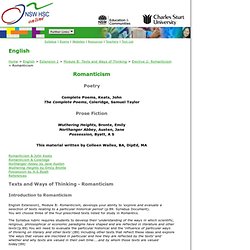
Percy Bysshe Shelley. Percy Bysshe Shelley (/ˈpɜrsi ˈbɪʃ ˈʃɛli/;[2] 4 August 1792 – 8 July 1822) was one of the major English Romantic poets, and is regarded by some critics as amongst the finest lyric poets in the English language.
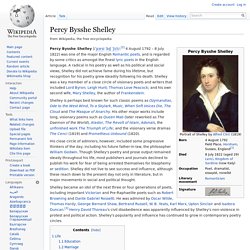
A radical in his poetry as well as his political and social views, Shelley did not achieve fame during his lifetime, but recognition for his poetry grew steadily following his death. Romanticism. If the Enlightenment was a movement which started among a tiny elite and slowly spread to make its influence felt throughout society, Romanticism was more widespread both in its origins and influence.
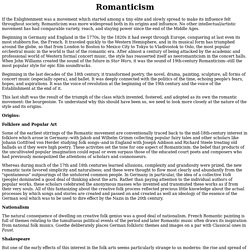
No other intellectual/artistic movement has had comparable variety, reach, and staying power since the end of the Middle Ages. Beginning in Germany and England in the 1770s, by the 1820s it had swept through Europe, conquering at last even its most stubborn foe, the French. It traveled quickly to the Western Hemisphere, and in its musical form has triumphed around the globe, so that from London to Boston to Mexico City to Tokyo to Vladivostok to Oslo, the most popular orchestral music in the world is that of the romantic era.
Samuel Taylor Coleridge. Samuel Taylor Coleridge (21 October 1772 – 25 July 1834) was an English poet, literary critic and philosopher who, with his friend William Wordsworth, was a founder of the Romantic Movement in England and a member of the Lake Poets.
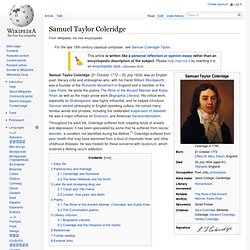
He wrote the poems The Rime of the Ancient Mariner and Kubla Khan, as well as the major prose work Biographia Literaria. His critical work, especially on Shakespeare, was highly influential, and he helped introduce German idealist philosophy to English-speaking culture. William Blake. William Blake (28 November 1757 – 12 August 1827) was an English poet, painter, and printmaker.
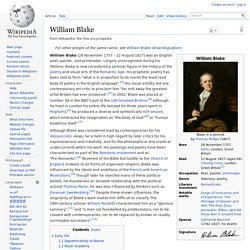
Largely unrecognised during his lifetime, Blake is now considered a seminal figure in the history of the poetry and visual arts of the Romantic Age. His prophetic poetry has been said to form "what is in proportion to its merits the least read body of poetry in the English language".[2] His visual artistry led one contemporary art critic to proclaim him "far and away the greatest artist Britain has ever produced".[3] In 2002, Blake was placed at number 38 in the BBC's poll of the 100 Greatest Britons.[4] Although he lived in London his entire life (except for three years spent in Felpham),[5] he produced a diverse and symbolically rich oeuvre, which embraced the imagination as "the body of God"[6] or "human existence itself".[7] Early life[edit] 28 Broad Street (now Broadwick Street) in an illustration of 1912.
Blake was born here and lived here until he was 25. Apprenticeship to Basire[edit] Inside Break: The Journey. William Wordsworth. English Romantic poet William Wordsworth (7 April 1770 – 23 April 1850) was an English Romantic poet who, with Samuel Taylor Coleridge, helped to launch the Romantic Age in English literature with their joint publication Lyrical Ballads (1798).
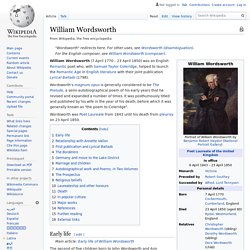
Wordsworth's magnum opus is generally considered to be The Prelude, a semi-autobiographical poem of his early years that he revised and expanded a number of times. Romanticism. Defining Romanticism[edit] Basic characteristics[edit]
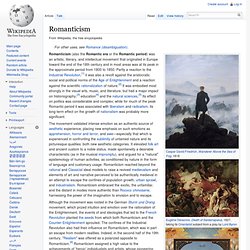
Lord Byron. He travelled all over Europe especially in Italy where he lived for seven years and then joined the Greek War of Independence fighting the Ottoman Empire, for which Greeks revere him as a national hero.[1] He died one year later at age 36 from a fever contracted while in Missolonghi in Greece.

Often described as the most flamboyant and notorious of the major Romantics, Byron was celebrated in life for aristocratic excesses, including huge debts, numerous love affairs with both sexes, rumours of a scandalous incestuous liaison with his half-sister, and self-imposed exile.[2] Early life[edit] Byron's paternal grandparents were Vice-Admiral the Hon.